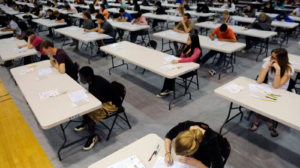Placement Exams: The Hidden Gateway

While many have focused on ACT and SAT, the tests that drive attendance at selectives (a small percentage of post secondary students), there has been little attention paid to placement exams—the real hurdle in the system for young adults that want to earn college credit. JFF just released a must read report, Where to Begin? The Evolving Role of Placement Exams. The paper opens with this conclusion:
For years, colleges have used placement exams to determine whether to deem incoming students “college ready” or assign them to developmental education. But emerging information reveals the tests have little correlation to students’ future success, casting doubt on their use even as the high stakes for students of taking remedial courses become clear. Educators are rethinking whether the tests are fair and wondering if their traditional use constitutes a barrier to college completion.
The report concludes that the tests are narrowly focused and weak predictors of success. They suggest that accelerating students out of developmental courses has some promise (but don’t tell upper division profs that they’ll be getting more unprepared students).
Some states are considering:
- Customized assessments: Several states are adopting assessments aligned with their curricula.
- Diagnostic assessments: These could offer more information on students’ strengths and weaknesses than traditional cutoff scores. However, states vary in how they define “diagnostic.”
- College-readiness tests and courses in high school: Some systems have adopted programs or policies for eleventh graders to take college placement tests, based on the theory that the tests send a signal to high schools about the preparation students need.
- Other test preparation assistance: Many students do not realize the high stakes of placement tests; also, severe placement errors are common. These facts suggest that some students could bypass developmental education if they brushed up their skills in math or English. Colleges experimenting with this approach report early success.
The author speculates that “with multiple measures and Common Core assessments coming into play, there will be a move toward less reliance on placement test results.” In that regard, we think Coleman’s move to College Board is a big deal. We’re also optimistic about multiple measures as discussed by David Conley in an interview on college & career Readiness. It’s clear that we must align high school exit and college credit eligibility.
The solution is not just placing more unprepared students into upper division coursework in college. We can do a much better job customizing developmental preparation as evidenced by Knewton’s early success engaging students with personalized, adaptive math courses. (Also see 6 Ways Continuous Assessment Can Help Students Learn.)
But the bottom line is that we simply must graduate more college ready students from American high schools. Digital Learning Now! suggests (in Element 4) that end of course exams should be available on demand as students complete their studies. If they need more time and assistance, they should get it immediately not being forced to repeat the course—or showing up years later at a college and being placed in an upper division course without adequate preparation.








Debt Free Teen
I took a math placement test and an English placement test upon entering community college. The first couple of math classes I took weren't transferable but I placed well on the English portion.
I have found that the English class I am taking now is short on instruction and the teacher just assigns papers. It's an online class and I am doing well in it but I don't feel like I am learning anything.
In high school, a hybrid school, we had to go back and make corrections to our papers and then put together a portfolio of all our work for our final project. It was an excellent class!
Chase